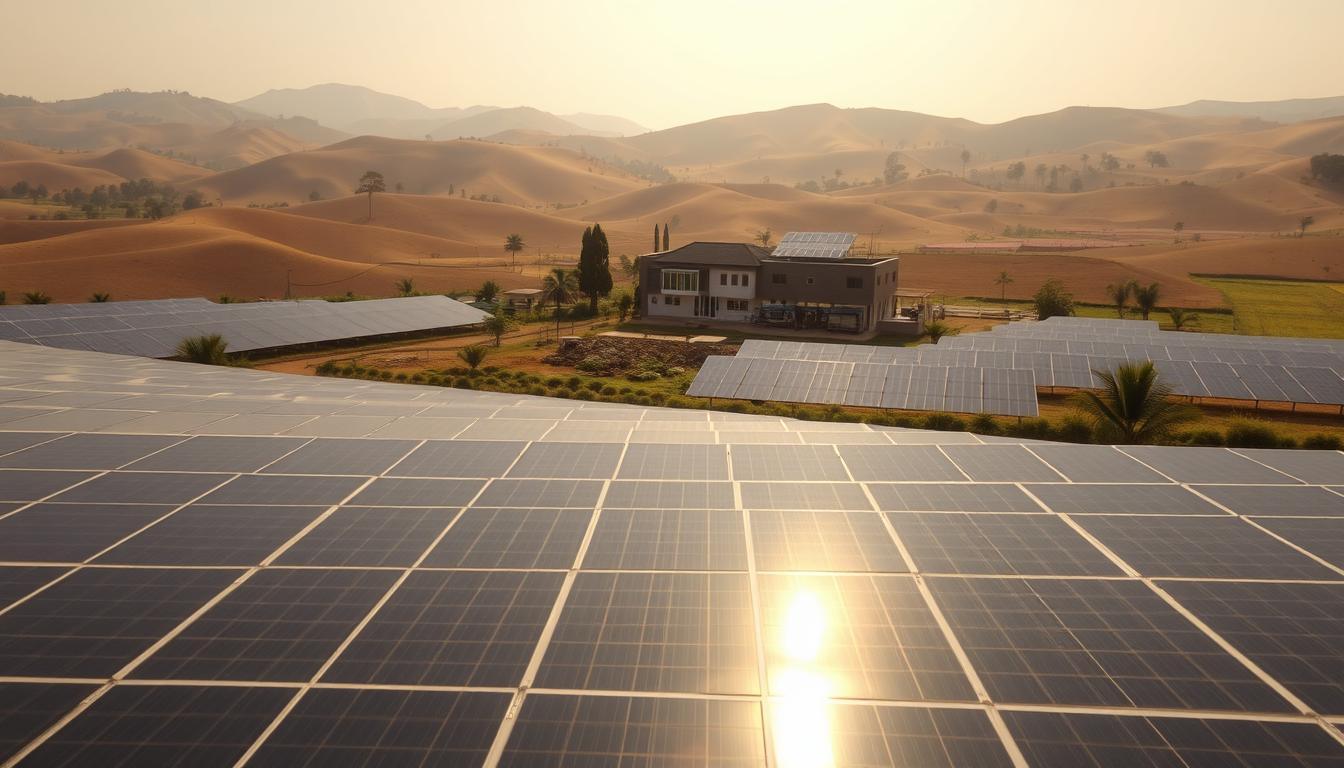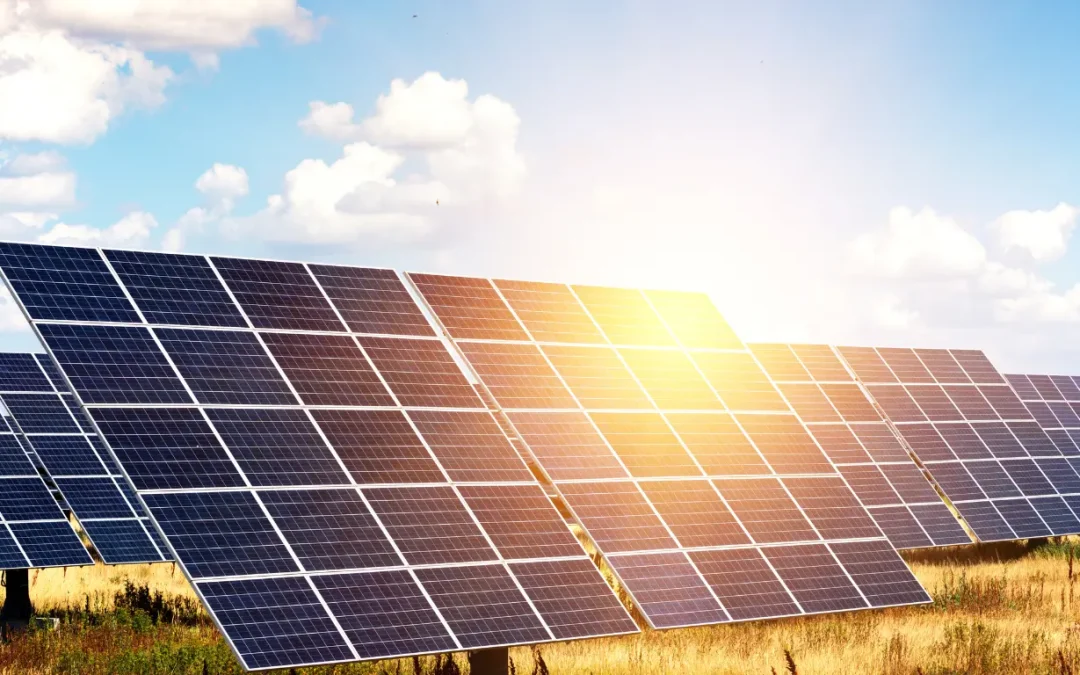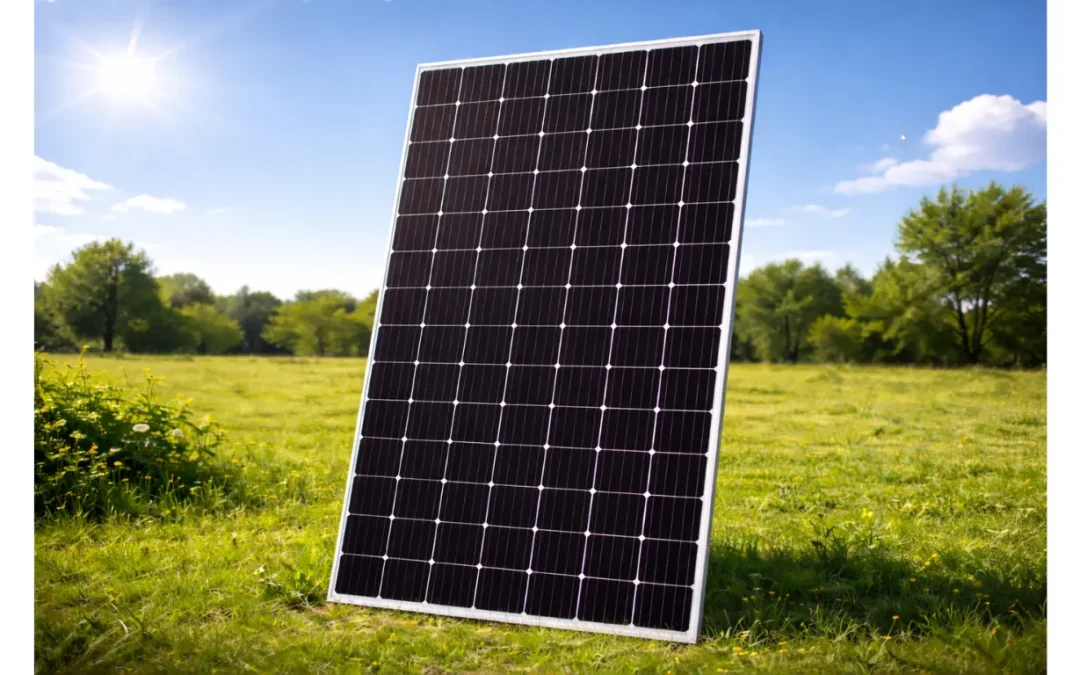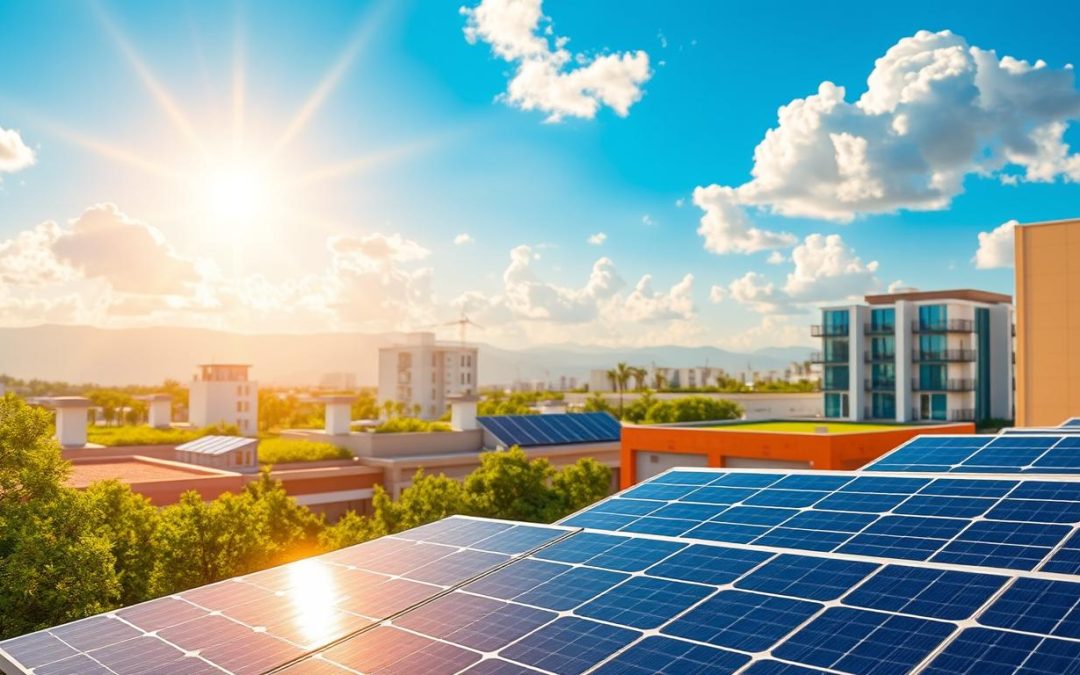Solar energy in India is growing fast, attracting both homeowners and businesses. This guide is here to help you understand solar panels before you buy. We cover everything from the types of panels to their benefits. Our goal is to make your choice easier by focusing on India’s solar energy scene.
Key Takeaways
- Understanding solar energy is key for smart buying in India.
- Solar panels can cut down your electricity bills and help the planet.
- There are many solar panels for different needs and budgets.
- Look for good warranties and quality certifications.
- The Indian government has incentives to boost solar energy use.
Introduction to Solar Energy in India
Solar energy in India is quickly becoming a key part of the country’s energy mix. India is now a major player in the global solar market. This growth is thanks to government efforts like the National Solar Mission.
By late 2023, India’s solar power had grown a lot. It’s now a big part of the national grid, helping the country grow in a green way. The government wants to do even more, aiming to increase solar power even more.
Switching to solar energy shows India’s commitment to the environment and its economy. More businesses and homes are using solar power. This move is good for the planet and can save money on electricity bills.
Understanding Solar Panels: Basics and Types
India is now focusing more on renewable energy, making solar panels a key choice. Knowing about the different types of solar panels is important. Solar technology has advanced, leading to many panel types, each with its own features and uses.
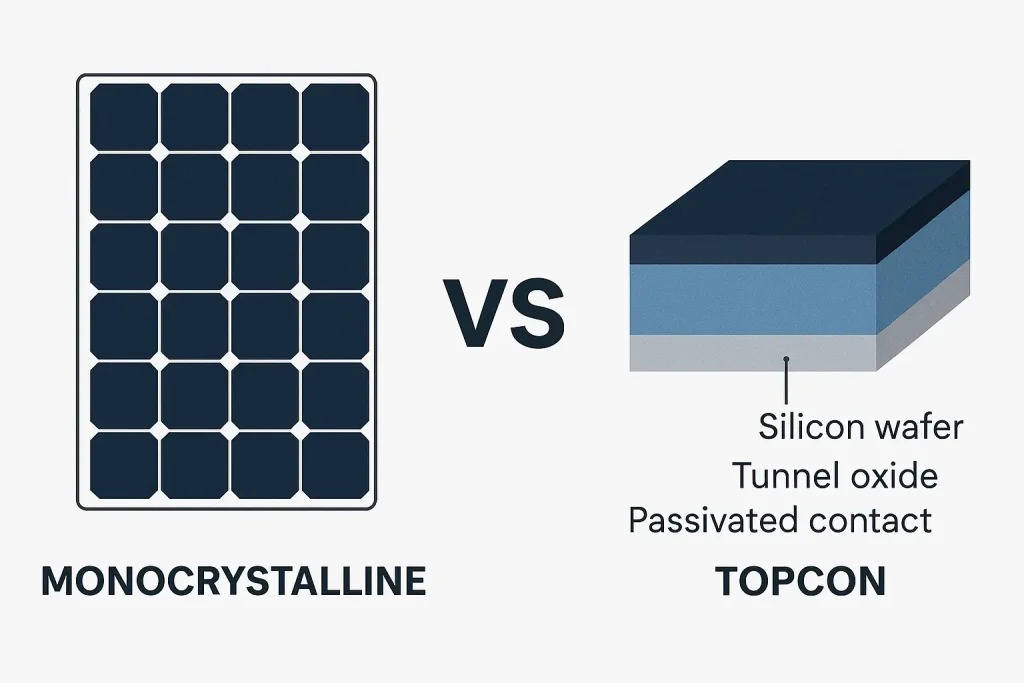
Monocrystalline vs. Polycrystalline Solar Panels
When looking at solar panels, you’ll often see monocrystalline and polycrystalline options. Both types are good at catching solar energy, but they differ in many ways.
- Monocrystalline panels: These panels are known for their high efficiency and long life. They work well even in low light and need less space.
- Polycrystalline panels: Made from many crystals, these panels are cheaper but less efficient than monocrystalline ones. They do well in hot weather, making them good for certain climates.
Thin-Film Solar Technology Explained
Thin-film technology is another new way to use solar energy. These panels are light and flexible, making them easy to install in different places. Even though they’re not as efficient as other panels, their flexibility is a big plus.
Importance of Solar Panels in the Indian Context
Solar energy is vital in India, given the growing need for electricity and the need for green solutions. Solar panels are a good choice for both cities and rural areas where electricity is scarce. They help use the sun’s power, reducing our need for traditional energy.
Using solar panels brings big changes for jobs and the economy. The solar industry has grown, creating jobs for many. This not only helps people find work but also lowers the cost of electricity for everyone.
Solar energy also helps bring electricity to rural areas. In many parts of India, old electrical systems are not up to date. Solar power is a smart fix, giving people and businesses the electricity they need. This helps schools, hospitals, and local businesses grow.
Solar Panel of India: Key Benefits
Investing in solar panels offers many advantages, mainly for homeowners. It helps cut down on energy costs and benefits the environment. Knowing the benefits can help you make a smart choice.
Cost Savings on Electricity Bills
Solar panels cut down your electricity bills by using the sun’s energy. This means you use less of the expensive fossil fuels. Over time, you save a lot of money, making solar energy both good for the planet and your wallet.
Environmental Impact and Sustainability
Switching to solar energy lowers your carbon footprint. It helps fight climate change and supports sustainability. Solar energy cuts down on harmful emissions, making the air cleaner and communities healthier.
Factors to Consider Before Buying Solar Panels
When you’re looking to buy solar panels, there are key things to think about. It’s important to know about the quality and warranty. This will help you make a smart choice for your solar energy investment. Look for panels that are high quality and meet certain standards.
Quality Standards and Certifications
The quality of solar panels affects how well they work and last. Look for panels with ISO and IEC certifications. These show they’ve been tested for quality and safety.
Warranty and Lifespan of Solar Panels
Warranty is a big deal when picking solar panels. Good manufacturers offer warranties from 10 to 25 years. Longer warranties often mean the panels are made to last.
| Quality Certifications | Common Warranty Periods | Expected Lifespan |
|---|---|---|
| ISO 9001 | 10-25 Years | 20-30 Years |
| IEC 61215 | 15-25 Years | 25-30 Years |
| UL 1703 | 20-25 Years | 20-25 Years |
Installing Solar Panels: What to Expect
Starting a solar energy project might seem scary, but knowing the steps can make it easier. Understanding the process helps homeowners feel more prepared and informed.
- Site Assessment: Your property is checked to find the best spot for solar panels.
- Panel Selection: You pick the right solar panels based on their efficiency, cost, and size.
- Permitting: You get the needed permits to follow local rules before starting the installation.
- System Design: A plan is made for your solar system.
- Installation: Skilled technicians install the panels and connect them to the inverter and grid.
- Inspection: After setup, checks are done to ensure standards are met.
- Final Connection: The system is linked to the grid for use.
IB Solar: A Trusted Indian Manufacturer
As solar energy demand grows in India, IB Solar shines as a top manufacturer focused on quality and sustainability. It supports the ‘Make in India’ initiative, boosting local solar production and reducing imports. Its product lines like the Omega Series and Optima Series are designed for high efficiency and long-term reliability.
IB Solar also provides complete EPC solutions for homes, commercial, and industrial projects. Learn more about IB Solar’s EPC services.
Comparing Solar Panel Brands in India
| Brand | Energy Efficiency Rating | Average Price per Watt | Warranty Period |
|---|---|---|---|
| IB Solar | 18% – 20% | ₹38 – ₹45 | 25 Years |
| Tata Power Solar | 17.5% – 19.5% | ₹45 – ₹50 | 25 Years |
| Vikram Solar | 17% – 19% | ₹40 – ₹48 | 25 Years |
| Waaree Energies | 17% – 18.5% | ₹38 – ₹44 | 25 Years |
| Adani Solar | 17% – 19% | ₹41 – ₹49 | 25 Years |
Conclusion
Investing in solar panels is a big step towards a greener future for India. It saves money on electricity bills and helps the environment. The Indian government is also supporting solar energy, making it a great time to switch to cleaner energy.
IB Solar is one of the most reliable brands to consider, offering competitive pricing, strong warranties, and panels suited for Indian conditions.

